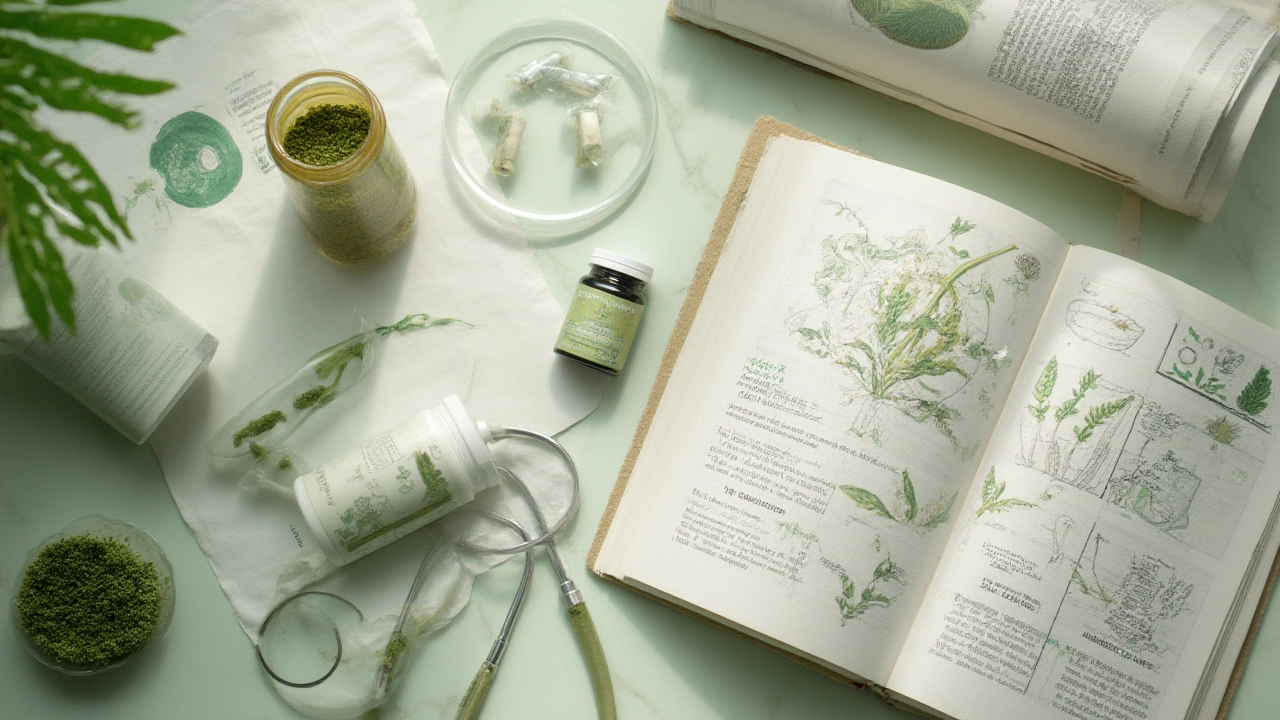If you told your friends you're taking something called abuta, they'd probably ask if you're starting a new trend. Truth is, abuta isn't just the next big thing—it's an ancient Amazonian secret everyone seems to be whispering about these days. For centuries, villagers along the Amazon River have used abuta to help with everything from aches and cramps to stress and digestive woes. But only recently has science started catching up with those stories, and the results are actually wild: this vine might be packing more benefits than most mainstream dietary supplements out there right now. So what is abuta really? It’s a climbing plant, known as Cissampelos pareira, and it’s been a staple herb in traditional Amazonian and Afro-Brazilian medicine for generations. Now, bottles of abuta supplements are showing up on the shelves of health stores from Brooklyn to Berlin, bringing old-world plant wisdom to modern wellness routines.
What Makes Abuta So Special?
Walk through an Amazonian village and you’ll probably see abuta vines winding around trees, their heart-shaped leaves catching flashes of sunlight. Local herbalists have long brewed abuta stems and roots as a tea, sometimes calling it “the midwife’s herb” because of its legendary use in supporting women’s health. But abuta isn’t just for one thing—what’s truly fascinating is how many ways people have relied on it. Traditional stories talk about using it for muscle aches after long fishing trips, for calming nerves during tough seasons, and for reducing inflammation after a cut or bite because Amazon life isn’t exactly gentle. When scientists finally took abuta into the lab, they found a bunch of alkaloids, flavonoids, and even saponins that seem to fight inflammation, pain, and some infections. One interesting fact: abuta also contains compounds that may help balance hormones, which explains its use for menstrual cramps and even mild symptoms of menopause, according to a 2019 study from Rio de Janeiro State University.
People are now using abuta supplements as capsules, tinctures, or teas, hoping to tap into those same traditional benefits. More than a handful of clinical trials have shown its effects on pain relief and digestive support, and some preliminary lab studies hint it may help support healthy immune responses and blood sugar control. The way abuta works is pretty unique—instead of overwhelming your system, it seems to gently tone down inflammatory responses and encourage your body’s own healing. That’s really different from popping a painkiller or an antifungal and just hoping for zero side effects. Some Amazonian guides explain it this way: abuta helps your body rediscover its own balance.
But here’s the thing—no herbal supplement is truly magical. Some people feel a big difference within weeks; others say it’s more of a slow-burn benefit. Much depends on your baseline health, what else you’re taking, and, let’s be honest, the quality of the abuta itself. A wild-harvested vine, processed traditionally, might be far more potent than lab-farmed versions. If you’re buying it, look for trusted brands that mention their sourcing. Trust your senses too: high-quality abuta powder smells earthy, almost like the Amazon floor after rain, and abuta tea has this slightly bitter, green taste (you can always add a dash of honey). The *key* here? Consistency over time, as with most plant-based wellness tools. Instead of chasing instant results, give it a shot for at least a month and track whether your symptoms—especially hormonal swings or low-grade aches—change. Keep your doctor in the loop if you’re managing ongoing health conditions, just to play it safe.

How to Use Abuta Safely and Smartly
Tossing random herbs into your daily routine might sound fun, but abuta deserves a bit more respect than that. This plant is potent, and using it thoughtfully is the real secret if you want to unlock its benefits. First up—quality matters, a lot. With so many new brands trying to cash in on the herbal supplement craze, it’s easy to end up with something that’s more filler than benefit. Third-party certifications, transparency about sourcing (bonus points for wild-harvested or sustainable farming), and clear labeling are musts. Some of the best abuta supplements out there use non-GMO plant material and minimal processing to keep those beneficial alkaloids intact. If you can, look for brands that test for heavy metals or pesticides, since you want your healing herb to be, you know… actually healthy.
Now, how much should you take? Most supplements on the market recommend around 300–500 mg a day, but if you’re using abuta tea, the strength can vary. In Brazil, people might brew one or two teaspoons of dried root per cup, steeped for 15 minutes. But remember, traditional healers often say to start light and pay attention to how your body responds. That’s advice worth stealing. If you’re trying abuta for hormonal balance, digestive support, or achy muscles, stick with that recommended daily dose for at least four weeks. If you’re pregnant or breastfeeding, it’s probably best to hold off, since traditional stories point to abuta’s use during childbirth—there’s just not enough safety data yet for daily supplement use in pregnancy. If you’re on blood-thinners or meds for blood pressure, chat with your healthcare provider before starting. Abuta is gentle, but it’s still active—that means interactions are possible.
Recipes? You bet. Add abuta tea to your morning routine in place of regular green tea, especially if you want a less jittery start to your day. Some people love mixing a dropperful of abuta tincture in their evening herbal tea for relaxation. Want to go all in? Try blending abuta powder into a smoothie with spinach, banana, and a scoop of protein powder. It won’t mask the taste (abuta is earthy!), but the right combo can turn it into a ritual you actually crave. Here’s a fun tip: if you love natural self-care, look up abuta-infused balms—Amazonian women sometimes use these topically for muscle tension, and with the right essential oils, it’s heaven on tired joints. Just don’t overdo it; abuta should feel supportive, not overwhelming. Always listen to your body’s signals—if anything feels off, pause and troubleshoot.
Curious about combining abuta with other supplements? There’s some wisdom in teaming it with turmeric or ginger for double the anti-inflammatory punch, but only if your stomach handles the mix. Some people also say abuta and ashwagandha make a crazy-good combo for managing stress and hormonal swings (hello, calmer mood days!). If you’re taking meds or have a chronic condition, ask your doctor before layering on more herbs. Abuta rarely causes side effects, but very large doses have caused queasiness or mild digestive upset for a few sensitive people—so, as with all things in wellness, moderation wins.

Real-Life Stories and the Future of Abuta
It’s one thing to rattle off science-backed facts, but most people want to know: does abuta actually work in real life? Take the story of Ana, who struggled with cramping and fatigue every month until switching to abuta tea, recommended by her Brazilian grandmother. Within two cycles, her cramps cut in half, and she started sleeping better to boot. Or Lucas, who picked up abuta capsules for sore knees after soccer games; he didn’t notice much at first, but after a few weeks, he realized he was recovering faster with less swelling. These stories are popping up all over Reddit wellness threads, Facebook groups, and in health forums—and they echo the experiences documented by ethnobotanists who spent time with Amazonian healers. Will everyone see game-changing results? Probably not. But more people are sharing success stories than ever, and fresh studies are tracking real results with modern metrics.
The evolution of abuta from Amazonian household remedy to global super-herb reflects a bigger trend: people want plant-based wellness that helps the body restore itself, not just silence symptoms for a while. This is where abuta really shines. Besides its uses for women’s health, communities have relied on it for joint pain, calming troubled digestion, and even supporting emotional resilience in stressful times. Some scientists at the University of São Paulo even published a review in 2021 explaining how abuta’s unique alkaloids can promote healthy neurotransmitter balance, which might explain those who say it takes the edge off anxiety without making them drowsy or foggy.
There’s also something almost rebellious about turning back to nature for answers in a world obsessed with quick fixes and high-tech pills. People are frustrated with endless prescriptions and harsh side effects, so a natural dietary supplement like abuta supplement feels refreshing—down-to-earth, but also rooted in something much older than a drugstore brand. Researchers are stepping up their game too, planning clinical studies to crack open abuta’s role in immune health, hormonal function, and maybe even metabolic balance. Don’t be surprised if in a few years, abuta-based blends are everywhere, from wellness shots to recovery balms for athletes.
Want to get started? A small change now—like swapping your usual afternoon tea for abuta, or sticking with a daily abuta capsule—could be a gentle catalyst for better energy, mood, and recovery. Keep a journal, check in with professionals if you have questions, and treat it as an experiment. Half the magic of abuta comes down to intention—a mix of honoring traditional wisdom and trusting your own body’s feedback. If friends start asking what’s changed and why you seem so resilient, you can let them in on this centuries-old wellness secret that’s suddenly having a huge, modern moment. Isn’t it wild how the
